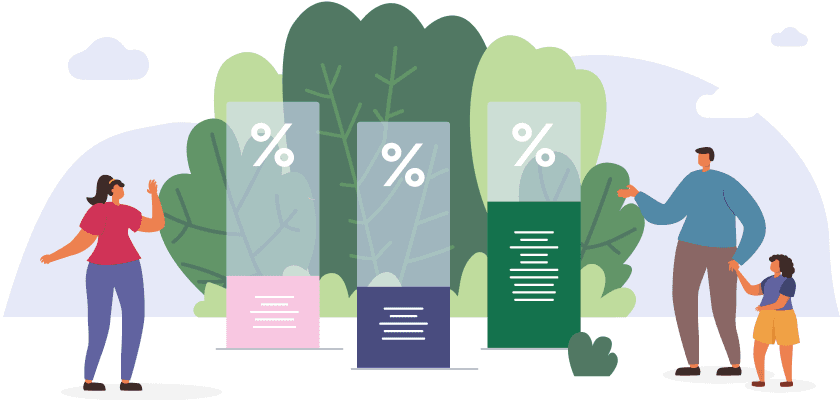Acts of kindness for your future self

Planning your future finances can be a daunting task, but it doesn’t have to be. In fact, it’s pretty easy to set yourself some targets. Simply find the answers to these three questions and you’ll have a clear view of your path to retirement. Your future self will thank you!
1. How do I want to live in later life?
You don’t need to overdo it when planning ahead. If you know how much your lifestyle will cost when you retire, you know how much you need to save up.
Rough estimates are fine here. And to make it even simpler, the Pensions and Lifetime Savings Association have laid out some guidelines: three suggested annual budgets ranging from the bare minimum to a life of luxury.
Minimum: Covers all your needs, with some left for fun
Single: (£15,700 in London)
Couple: (£24,500 in London)
Moderate: More financial security and flexibility
Single: (£32,800 in London)
Couple: (£44,900 in London)
Comfortable: More financial freedom and some luxuries
Single: (£45,000 in London)
Couple: (£61,200 in London)
What could you realistically afford with these annual budgets? For a breakdown by category, including house, food, transport, leisure and more, see the Retirement Living Standards.
2. Am I saving enough now?
When you know how much you’ll need to take from your pension each year, using the living standards above as a rough guide, the next step is fairly simple.
Multiply your annual budget by the number of years you think you’ll need it. For example, if you think you’ll live off the money for thirty years, multiply by thirty.
This number is now the overall target for your pension pot. It’s the total amount you’ll need to save by the time you retire (or the time you’ll start taking your pension, if you intend to continue working).
So, are you saving enough now to meet this target? To find out, let’s turn to government-backed educator MoneyHelper and their simple Pension Calculator.
3. When would I like to take my pension?
You can take your pension from age 55 if you want to (57 from 2028), but you might be better off leaving the money where it is a bit longer. If you take it too early or spend it too quickly, there’s a chance it could run out – it needs to last the rest of your life, after all.
So, when’s best for you? If you’ve downloaded the Cushon app, you have a simple tool to help work this out. (If not, search for ‘Cushon’ in your app store.)
When you set your target retirement age in the app, you’ll see an estimate of how much your savings could be worth at that point. If you think you’ll need more, you can adjust the target age and instantly see how it would effect your savings.
How to change your target age in the Cushon app
For more guidance around setting the right age to meet your financial goals, watch our quick vid on Three things to think about when setting a target age.
Bonus round: get to know your options at retirement
Spend half an hour with Jonny the pension geek and Sarah the queen of wellbeing. In this eye-opening (and fun!) video, we’ll show you what happens when you reach retirement age and walk you through the options.
Article by
NatWest Cushon
You may also like...

Financial know-how
Why and how to transfer your old pension pots to Cushon
This article explains why you might consider bringing your different pension pots together, and how easy it is to do with the Cushon app. (You don’t even need to know where your pots are!)
NatWest Cushon Explainer

Financial know-how
Who gets your money if you die?
This article explains what happens to your pension savings after you're gone, and how you can direct the money to the people or places you want to receive it.
NatWest Cushon Explainer

Financial know-how
Three ways that pensions are a money multiplier
This article explains the main reasons why saving into a pension can be so rewarding over time.
NatWest Cushon Explainer

Financial know-how
How we invest your money over time
This article explains how pension investments work, what your money is invested in, and why the way your money is invested changes over time.
NatWest Cushon Explainer